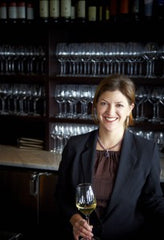People often wonder where to begin when looking to start a career in wine. Whether you’re starting fresh out of the gates from one of our programs or workshops or considering a career change, the wine trade holds a romantic allure for many a lover of wine. San Francisco Wine School reached out to its friends from all sides of the wine industry to put together proven career advice from the pros. Breaking into the wine world can be tough, but these experts offer their best advice on landing your dream job, while shedding light on how they hire, what they look for in job candidates, and their own first-hand experiences.
Shelley Lindgren, Wine Director/Owner, A16
I believe it is very difficult to think of being a Sommelier without having been a Server. Serving for 14 years, before having the confidence or wherewithal that I could be a Sommelier, gave me the ability to work well with the whole team, be able to time wine and food pairings efficiently and feel confident throughout the years by gaining a foundation of wine knowledge.

Randy Caparoso, Editor at Large, The SOMM Journal Founding Partner / former Corporate Wine Director, Roy’s Restaurants
My advice is simple: be choosy. Potential employers look for success; not just talent, intelligence, knowledge and accreditations (although everything helps). But the vast majority of wine related jobs are with companies that value profitability and business acumen above all else; and to land the best of those jobs, it makes sense to build your résumé by gaining experience with employers or companies that are profitable, and have a record of growth and critical acclaim. If you’re choosy about whom you are associated, then you are naturally a top candidate for the top employers.
 Andrew Green, Partner & President of Fine Dining, Bacchus Management Group
Andrew Green, Partner & President of Fine Dining, Bacchus Management Group
For the last 5 years we have not had to hire a sommelier from outside our group of 10 restaurants. We have hired entry level employees and promoted from within. Our farm league, or bench, currently has 3-4 employees waiting for the 3rd sommelier position to open in one of the restaurants. This farm system has been working for managers as well as sommeliers. It is much less disruptive to operations and the company culture to bring people in at entry level versus bringing in top level people. My advice to anyone looking for a sommelier job is to get a foot in the door as a server or captain in a Michelin star restaurant. With the economy over the last 9 months, it’s been harder to find great entry level employees. I want to know how badly the applicant wants the job. Fine dining experience is more important to me than wine knowledge. I hire the attitude and work ethic and try to make sure they share our values and will fit into our corporate culture. It’s also important for applicants to have good references, both the ones they list and other people at their former employer.
 Quinton Jay, Former Managing Director, Bacchus Capital Management / Owner Bacchus Wine & Spirits
Quinton Jay, Former Managing Director, Bacchus Capital Management / Owner Bacchus Wine & Spirits
The wineries we own or invest in are small businesses often with not much bench strength. As such, multiple skill sets are needed but real mastery in at least one – “Jack of all trades, master of ONE”. People with a background in finance are often attractive candidates for us. They need to have more than just passion. Wine is more than romance, it is still work. Restaurant and hospitality people have great transferable skills, but often need to learn how to drive customers in the door.
Nan Brown, Managing Partner, Barrett Brown Group
Foremost, you need to be strategic! Spend some time doing your homework and have a plan. Since most people use the most obvious channels of job board postings on the internet, ads, Linkedin and spend an enormous amount of time sending out resumes, often, never getting a response, use that as only one facet of your search. Be different and do the extra step.
Research the industry and the companies. Go to the store and look at the brands you like and figure out why certain brands are separated by tier in the grocery store and what that means in the market. While you are making a wine selection, ask the wine/spirits manager why wine is displayed like it is; use him/her for your networking as well. Investigate the wineries that appeal to you. Through your research, create a manageable list and learn all you can about the companies and why you would be a good employee for them. Find people who work in those companies and ask to talk to them about their jobs and why they like it there and what specifically they look for in new hires. Don’t expect that everyone will take time with you to do this. Don’t expect they will give you a job on the spot. But, if you make the right impression, they will remember you, become part of your network and suggest you to others, as appropriate. Go ahead and look at the job boards, and if your wish list company is hiring for a job you would be qualified for, write them a letter telling them why…..much more effective than simply sending a resume with basic cover letter.
This is the point where you can enlist the help of a recruiter most effectively. Find out what companies they work for; find out where there connections might be; tell them about your research and your list and ask them if they can help you. Remember that a recruiter is motivated by the job on his/her desk, as filling that job is the way we make our money. However, we are often impressed with certain candidates and often will take time to help in a job search or help market a candidate, if we think there is potential for a placement. Companies are always on the lookout for top talent.
In terms of transferable skills, functional areas within the cpg industry are usually the most likely to get attention, i.e. marketing, operations, sales. Often, it is easier in an area like finance or operations where there are basic and mandatory skill sets to make the transition. Direct-to-Consumer positions are much in demand and the retail space in a tasting room is another source for income, so those positions have been elevated in the past few years and are an area where an easier transition can be made.
In addition to these methods, there is always the volunteer work or part time work that you could do to get noticed. I can’t emphasize enough how many people do not take the extra step. Be different!
If you hire employees in the wine industry, what else do you look for? What strategies have helped you find your first wine job and/or better jobs in the wine business?



 Andrew Green, Partner & President of Fine Dining, Bacchus Management Group
Andrew Green, Partner & President of Fine Dining, Bacchus Management Group Quinton Jay, Former Managing Director, Bacchus Capital Management / Owner Bacchus Wine & Spirits
Quinton Jay, Former Managing Director, Bacchus Capital Management / Owner Bacchus Wine & Spirits